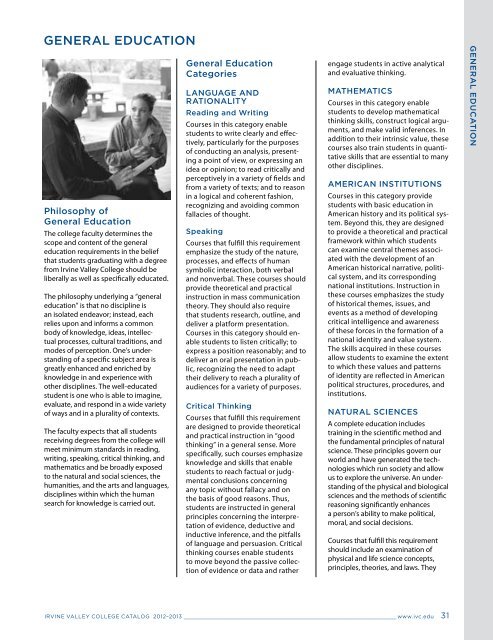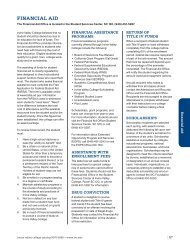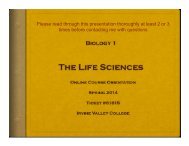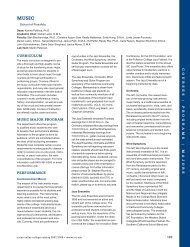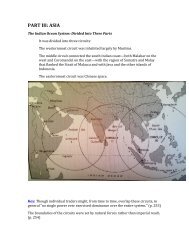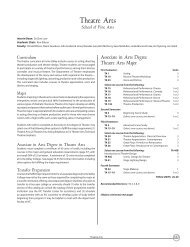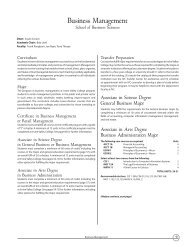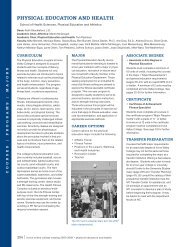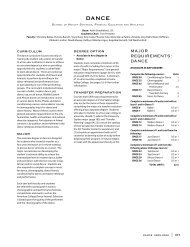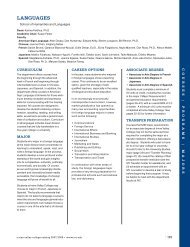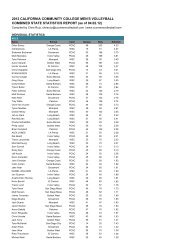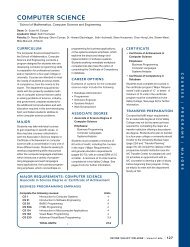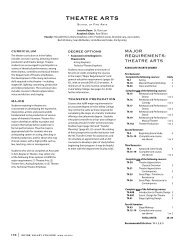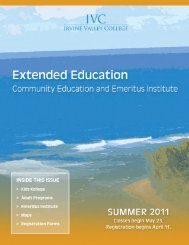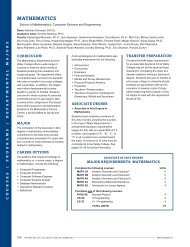Download - Irvine Valley College
Download - Irvine Valley College
Download - Irvine Valley College
Create successful ePaper yourself
Turn your PDF publications into a flip-book with our unique Google optimized e-Paper software.
general education<br />
DEGREES/ EMPHASIS<br />
Philosophy of<br />
General Education<br />
The college faculty determines the<br />
scope and content of the general<br />
education requirements in the belief<br />
that students graduating with a degree<br />
from <strong>Irvine</strong> <strong>Valley</strong> <strong>College</strong> should be<br />
liberally as well as specifically educated.<br />
The philosophy underlying a “general<br />
education” is that no discipline is<br />
an isolated endeavor; instead, each<br />
relies upon and informs a common<br />
body of knowledge, ideas, intellectual<br />
processes, cultural traditions, and<br />
modes of perception. One’s understanding<br />
of a specific subject area is<br />
greatly enhanced and enriched by<br />
knowledge in and experience with<br />
other disciplines. The well-educated<br />
student is one who is able to imagine,<br />
evaluate, and respond in a wide variety<br />
of ways and in a plurality of contexts.<br />
The faculty expects that all students<br />
receiving degrees from the college will<br />
meet minimum standards in reading,<br />
writing, speaking, critical thinking, and<br />
mathematics and be broadly exposed<br />
to the natural and social sciences, the<br />
humanities, and the arts and languages,<br />
disciplines within which the human<br />
search for knowledge is carried out.<br />
General Education<br />
Categories<br />
Language and<br />
Rationality<br />
Reading and Writing<br />
Courses in this category enable<br />
students to write clearly and effectively,<br />
particularly for the purposes<br />
of conducting an analysis, presenting<br />
a point of view, or expressing an<br />
idea or opinion; to read critically and<br />
perceptively in a variety of fields and<br />
from a variety of texts; and to reason<br />
in a logical and coherent fashion,<br />
recognizing and avoiding common<br />
fallacies of thought.<br />
Speaking<br />
Courses that fulfill this requirement<br />
emphasize the study of the nature,<br />
processes, and effects of human<br />
symbolic interaction, both verbal<br />
and nonverbal. These courses should<br />
provide theoretical and practical<br />
instruction in mass communication<br />
theory. They should also require<br />
that students research, outline, and<br />
deliver a platform presentation.<br />
Courses in this category should enable<br />
students to listen critically; to<br />
express a position reasonably; and to<br />
deliver an oral presentation in public,<br />
recognizing the need to adapt<br />
their delivery to reach a plurality of<br />
audiences for a variety of purposes.<br />
Critical Thinking<br />
Courses that fulfill this requirement<br />
are designed to provide theoretical<br />
and practical instruction in “good<br />
thinking” in a general sense. More<br />
specifically, such courses emphasize<br />
knowledge and skills that enable<br />
students to reach factual or judgmental<br />
conclusions concerning<br />
any topic without fallacy and on<br />
the basis of good reasons. Thus,<br />
students are instructed in general<br />
principles concerning the interpretation<br />
of evidence, deductive and<br />
inductive inference, and the pitfalls<br />
of language and persuasion. Critical<br />
thinking courses enable students<br />
to move beyond the passive collection<br />
of evidence or data and rather<br />
engage students in active analytical<br />
and evaluative thinking.<br />
Mathematics<br />
Courses in this category enable<br />
students to develop mathematical<br />
thinking skills, construct logical arguments,<br />
and make valid inferences. In<br />
addition to their intrinsic value, these<br />
courses also train students in quantitative<br />
skills that are essential to many<br />
other disciplines.<br />
American Institutions<br />
Courses in this category provide<br />
students with basic education in<br />
American history and its political system.<br />
Beyond this, they are designed<br />
to provide a theoretical and practical<br />
framework within which students<br />
can examine central themes associated<br />
with the development of an<br />
American historical narrative, political<br />
system, and its corresponding<br />
national institutions. Instruction in<br />
these courses emphasizes the study<br />
of historical themes, issues, and<br />
events as a method of developing<br />
critical intelligence and awareness<br />
of these forces in the formation of a<br />
national identity and value system.<br />
The skills acquired in these courses<br />
allow students to examine the extent<br />
to which these values and patterns<br />
of identity are reflected in American<br />
political structures, procedures, and<br />
institutions.<br />
Natural Sciences<br />
A complete education includes<br />
training in the scientific method and<br />
the fundamental principles of natural<br />
science. These principles govern our<br />
world and have generated the technologies<br />
which run society and allow<br />
us to explore the universe. An understanding<br />
of the physical and biological<br />
sciences and the methods of scientific<br />
reasoning significantly enhances<br />
a person’s ability to make political,<br />
moral, and social decisions.<br />
Courses that fulfill this requirement<br />
should include an examination of<br />
physical and life science concepts,<br />
principles, theories, and laws. They<br />
GENERAL educatiON<br />
<strong>Irvine</strong> <strong>Valley</strong> <strong>College</strong> Catalog 2012–2013_________________________________________________________________ www.ivc.edu 31


